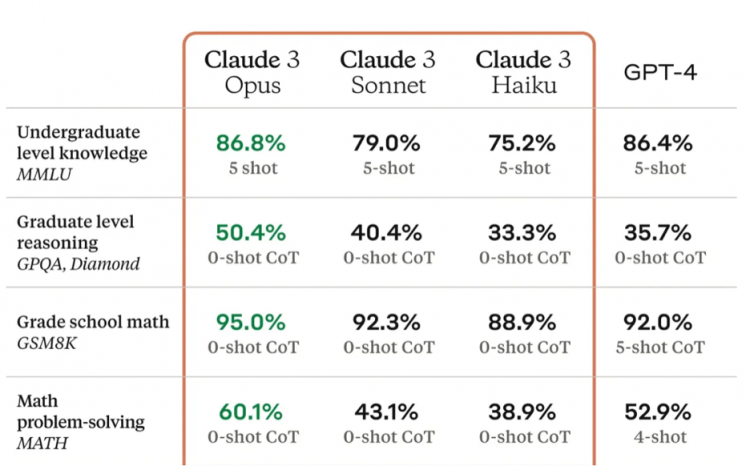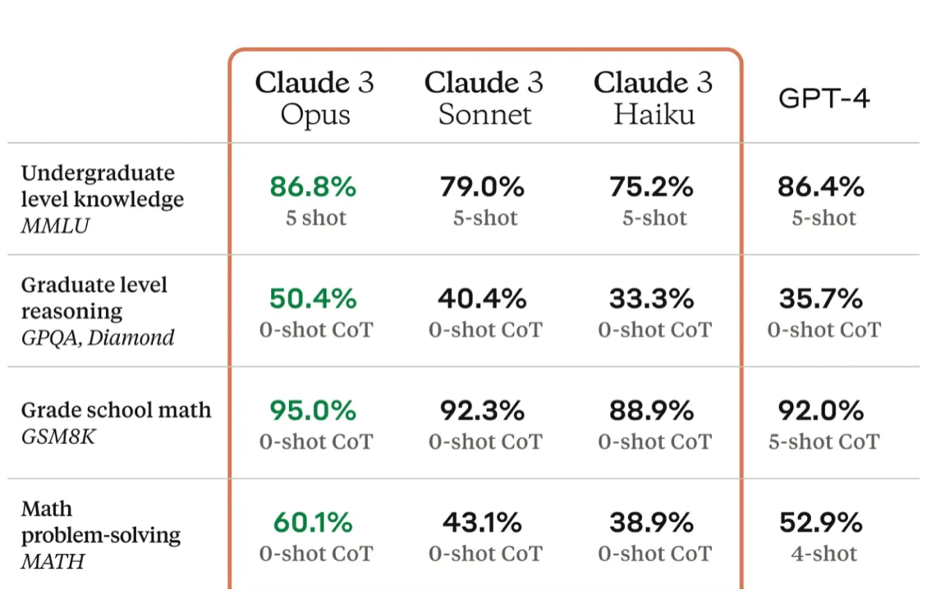Claude 3 – The Next Generation of AI Assistants

It almost took a year, but we finally have a challenger for GPT-4. In the rapidly evolving field of artificial intelligence, a new milestone has been reached with the introduction of Claude 3, the latest iteration of Anthropic’s groundbreaking AI assistant. Building upon the success of its predecessors, Claude 3 promises to revolutionize the way we interact with and leverage the power of AI.

At the core of Claude 3 lies a cutting-edge language model trained on an unprecedented scale, incorporating vast amounts of data from diverse domains. This extensive training has endowed Claude 3 with a remarkable breadth of knowledge and capabilities, allowing it to tackle a wide range of tasks with unparalleled proficiency.
One of the most striking features of Claude 3 is its natural language processing (NLP) prowess. With an advanced understanding of human language and context, Claude 3 can engage in seamless conversations, comprehending and responding with a level of fluency and coherence that blurs the line between human and machine. Whether you need assistance with writing, research, analysis, or problem-solving, Claude 3 is an invaluable companion, capable of providing insightful and well-reasoned responses.
In addition to its language capabilities, Claude 3 boasts impressive skills in areas such as coding, mathematics, and data analysis. Developers and researchers will find Claude 3 to be an indispensable tool, capable of generating code, debugging algorithms, and providing expert guidance on complex computational problems. Its ability to understand and manipulate data makes it a powerful asset for businesses and organizations seeking to leverage the potential of big data and advanced analytics.
While the recently released GPT-4 from OpenAI has garnered significant attention, Claude 3 holds its own as a formidable competitor in the AI assistant arena. Early benchmarks and real-world testing suggest that Claude 3 matches or even surpasses GPT-4 in certain domains, particularly when it comes to tasks requiring deep domain expertise or specialized knowledge. Anthropic’s focus on rigorous training across a diverse range of fields has endowed Claude 3 with a level of subject matter mastery that sets it apart. Additionally, Claude 3’s ethical training and commitment to responsible AI development could give it an edge over GPT-4 in applications where trustworthiness and transparency are paramount. As the AI landscape continues to evolve, the competition between these two powerhouse assistants is sure to drive rapid advancements, benefiting users and pushing the boundaries of what is possible with artificial intelligence.
The fierce competition between AI giants like OpenAI and Anthropic has not gone unnoticed by tech behemoths like Microsoft. In a strategic move to cement its position in the AI race, Microsoft has made significant investments in both companies. The tech giant’s partnership with OpenAI, which includes a multi-billion dollar investment, has been well-documented, allowing Microsoft to leverage OpenAI’s cutting-edge language models like GPT-4 across its products and services. However, Microsoft has also hedged its bets by investing in Anthropic, the company behind Claude 3. While the exact details of this investment remain undisclosed, it signals Microsoft’s recognition of Anthropic’s potential and its desire to have a stake in multiple AI frontrunners. This diversified approach not only mitigates risks but also grants Microsoft access to a broader range of AI capabilities, positioning the company as a major player in the rapidly evolving AI landscape.
For a biotech company seeking to harness the power of LLMs, the decision of which model to adopt should be driven by a careful cost-benefit analysis that takes into account the specific requirements of the organization. With GPT-4 and Claude 3 both commanding premium pricing, a biotech firm must weigh the costs against the potential gains in productivity, efficiency, and innovation. GPT-4, with its broader capabilities and name recognition, may be the more expensive option, but its versatility could justify the investment for companies with diverse AI needs. Conversely, Claude 3’s specialized strengths in areas like scientific research and data analysis could make it the more cost-effective choice for biotechs focused on core competencies like drug discovery or bioinformatics. Additionally, factors like ethical considerations, data privacy, and the need for customized fine-tuning should be evaluated, as these could tip the scales in favor of one LLM over the other. Ultimately, a biotech company should conduct thorough testing and piloting to assess the real-world performance and return on investment of each LLM before committing to a long-term solution.
As with any groundbreaking innovation, the introduction of Claude 3 raises important questions and considerations. How will this advanced AI assistant impact various industries and professions? What are the potential implications for privacy, security, and the future of work?
These are complex issues that will require ongoing dialogue and collaboration between researchers, policymakers, and the public.
Nonetheless, the arrival of Claude 3 marks a significant milestone in the field of AI, one that holds immense promise for enhancing our capabilities, driving innovation, and pushing the boundaries of what is possible. As we navigate the exciting and uncharted waters of this technological revolution, one thing is certain: Claude 3 is poised to be a game-changer, ushering in a new era of human-machine collaboration, and setting the stage for even greater advancements to come.
 >
> 

